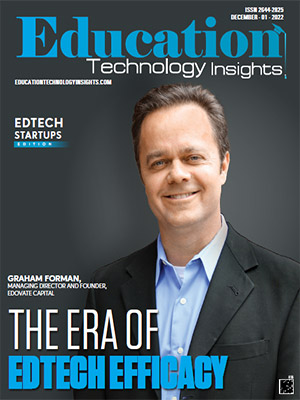THANK YOU FOR SUBSCRIBING
Be first to read the latest tech news, Industry Leader's Insights, and CIO interviews of medium and large enterprises exclusively from Education Technology Insights
The New Era of Education
Yrjö Ojasaar, Investment Partner, Change Ventures
 Yrjö Ojasaar, Investment Partner, Change Ventures
Yrjö Ojasaar, Investment Partner, Change VenturesExponential growth in technology and content over the past couple of years has vastly outpaced the glacial transformation of educational systems where change is usually measured in decades. Covid closures exposed and highlighted the inefficiencies and gaps in digital transformation capabilities of schools across the world, but entrepreneurs have stepped in to fill the void.
Before 1900 human knowledge doubled approximately every 100 years. By 1945, it was down to 25 years and now accumulated knowledge is estimated to double every 12 hours. The basic structuring of schools, classrooms, and lessons had changed very little in the last 50 years, or even since 1999 when we thought an extra digit was going to make our elevators and digital world crash on New Year’s Eve.
Today smartphones + BYOD (Bring Your Own Device) + ubiquitous WI-FIequals in sum that every student carries more computational power in their phone charger or USB stick than NASA had access to in putting a man on the Moon. Today’s smartphones are 100 times faster than IBM Deep Blue supercomputer that beat world chess champion, Garri Kasparov in 1997.
I believe the solution to better aligning the development of education and technology lies outside of government initiatives and bureaucracies and with the innovators working with students in edTech start-ups.EdTech entrepreneurs believe that students can do more on their phones than just crush candy and that they carry in their hands the solution for better learning. Start-ups are expanding the quality and quantity of educational experiences, increasing the pool of educators and knowledge, as well as expanding geographic and financial access much wider than ever before.
1. Expanding the pool of educators
No single human learn, retain or teach any one discipline, or even a complete course adequately alone any more. It turns out that it really does take a village to raise a child. Tutoring and teaching platforms are bringing many more individuals into the education equation. Sites like Udemy, Brightstorm, TutorMe, and Wyzantallow students to learn from a vast group of people with formal teaching experience and training, as well as on the job and life experience. This expansion is driving the learning experience to be more diverse, multi-disciplinary and practical. Now anyone can be a tutor, and everyone can learn anything from math and coding to cooking, art, anime, and speaking a foreign language.
2. Expanding learning globally
Students are no longer limited to just the educators and resources in their school or region but can learn from anyone in the world. A student from Malaysia can watch top Ivy League professor’s lectures on sites like Academic Earth, Coursera, Udemy and Lynda. Similarly, people that want to share their knowledge and experience are not limited to just the local student audience but can build a substantial business teaching students around the world. Platforms like Chatlas have also destroyed language barriers, Interactio and Hypersaythat offer a real-time interpretation, translation, and subtitles for lectures and presentations.
3. Reducing costs for everyone
Publishing ideas to people around the world now only takes seconds, and the cost is low or even free. Moreover, most new educational platforms do not require expensive computers or tablets to access quality online content and communication. Even VR can be experienced with just a $15 Google Cardboard set and your existing smartphone. Students can then take immersive field trips to the Seven Wonders of the World or any of the other 900 locations and experiences on Google Expeditions for free without leaving home or the classroom.
4. Improving educational content
Online platforms allow everyone to have access to the best content on every topic of interest. Static textbooks with legacy information can now be easily supplemented with interactive video, simulations, and AR/VR. These technologies have proven to be more effective at developing cognitive and psychomotor skills and improve retention and engagement. For great additional content, students can go to MakeMeGenius, How Stuff Works, Curiosity, and CosmoLearning.
5. Improving learning outcomes
The new technologies allow education to shift from the traditional one-size-fits-all model to personalized teaching based on real-time data where the curriculum is matched to each student’s capability, and pace of learning. AI/ML and synthesis of data allow educators to dynamically evaluate student performance, identify strengths and weaknesses, and prescribe tailored lessons and recommendations. Technology maximizes teaching effectiveness and learning becomes truly tailored to each student’s individual needs.
During this transition to the new age of edTech, it is important to remember that technology is just a tool to enhance learning, and the real focus should be on usability and the people that technology aims to help. Change Ventures aim to help all those entrepreneurs that are innovating and developing even better educational solutions to improve student outcomes.
Weekly Brief
ON THE DECK
Featured Vendors
Read Also
Building Future Leaders with Faith and Integrity
Virtualization as a Bridge For Multi-Campus Support
Building Practical Readiness in Cybersecurity Talent
The Liberal Arts to the Rescue
Faith Based Counseling Supporting Holistic Student Growth
Will ChatGPT End Higher Ed? Not So Fast

I agree We use cookies on this website to enhance your user experience. By clicking any link on this page you are giving your consent for us to set cookies. More info

























